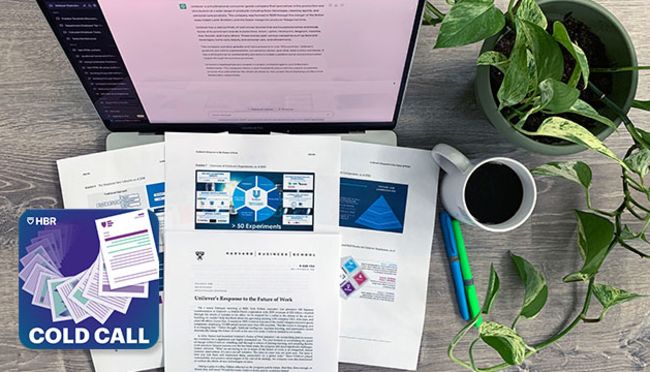
- 05 Jul 2023
- Cold Call Podcast
How Unilever Is Preparing for the Future of Work
Launched in 2016, Unilever’s Future of Work initiative aimed to accelerate the speed of change throughout the organization and prepare its workforce for a digitalized and highly automated era. But despite its success over the last three years, the program still faces significant challenges in its implementation. How should Unilever, one of the world's largest consumer goods companies, best prepare and upscale its workforce for the future? How should Unilever adapt and accelerate the speed of change throughout the organization? Is it even possible to lead a systematic, agile workforce transformation across several geographies while accounting for local context? Harvard Business School professor and faculty co-chair of the Managing the Future of Work Project William Kerr and Patrick Hull, Unilever’s vice president of global learning and future of work, discuss how rapid advances in artificial intelligence, machine learning, and automation are changing the nature of work in the case, “Unilever's Response to the Future of Work.”
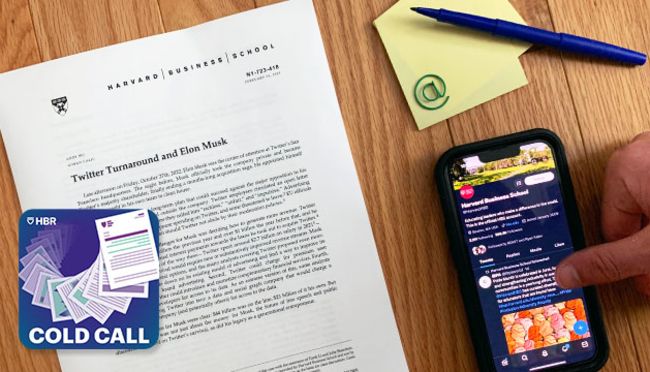
- 20 Jun 2023
- Cold Call Podcast
Elon Musk’s Twitter Takeover: Lessons in Strategic Change
In late October 2022, Elon Musk officially took Twitter private and became the company’s majority shareholder, finally ending a months-long acquisition saga. He appointed himself CEO and brought in his own team to clean house. Musk needed to take decisive steps to succeed against the major opposition to his leadership from both inside and outside the company. Twitter employees circulated an open letter protesting expected layoffs, advertising agencies advised their clients to pause spending on Twitter, and EU officials considered a broader Twitter ban. What short-term actions should Musk take to stabilize the situation, and how should he approach long-term strategy to turn around Twitter? Harvard Business School assistant professor Andy Wu and co-author Goran Calic, associate professor at McMaster University’s DeGroote School of Business, discuss Twitter as a microcosm for the future of media and information in their case, “Twitter Turnaround and Elon Musk.”
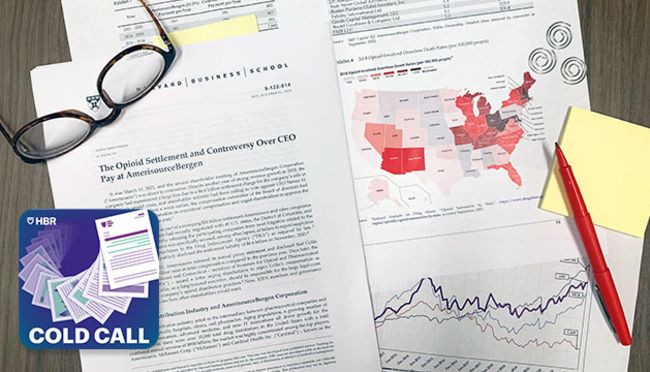
- 06 Jun 2023
- Cold Call Podcast
The Opioid Crisis, CEO Pay, and Shareholder Activism
In 2020, AmerisourceBergen Corporation, a Fortune 50 company in the drug distribution industry, agreed to settle thousands of lawsuits filed nationwide against the company for its opioid distribution practices, which critics alleged had contributed to the opioid crisis in the US. The $6.6 billion global settlement caused a net loss larger than the cumulative net income earned during the tenure of the company’s CEO, which began in 2011. In addition, AmerisourceBergen’s legal and financial troubles were accompanied by shareholder demands aimed at driving corporate governance changes in companies in the opioid supply chain. Determined to hold the company’s leadership accountable, the shareholders launched a campaign in early 2021 to reject the pay packages of executives. Should the board reduce the executives’ pay, as of means of improving accountability? Or does punishing the AmerisourceBergen executives for paying the settlement ignore the larger issue of a business’s responsibility to society? Harvard Business School professor Suraj Srinivasan discusses executive compensation and shareholder activism in the context of the US opioid crisis in his case, “The Opioid Settlement and Controversy Over CEO Pay at AmerisourceBergen.”
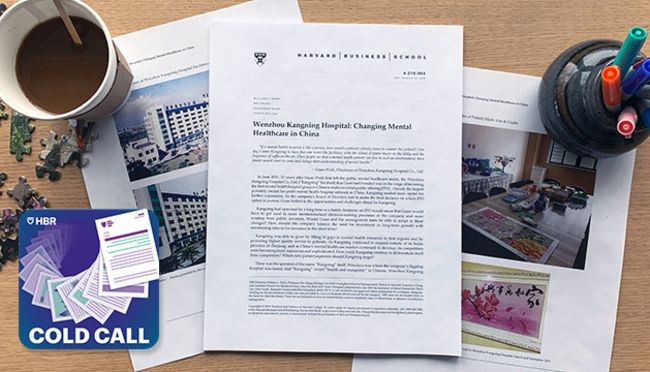
- 23 May 2023
- Cold Call Podcast
The Entrepreneurial Journey of China’s First Private Mental Health Hospital
The city of Wenzhou in southeastern China is home to the country’s largest privately owned mental health hospital group, the Wenzhou Kangning Hospital Co, Ltd. It’s an example of the extraordinary entrepreneurship happening in China’s healthcare space. But after its successful initial public offering (IPO), how will the hospital grow in the future? Harvard Professor of China Studies William C. Kirby highlights the challenges of China’s mental health sector and the means company founder Guan Weili employed to address them in his case, Wenzhou Kangning Hospital: Changing Mental Healthcare in China.
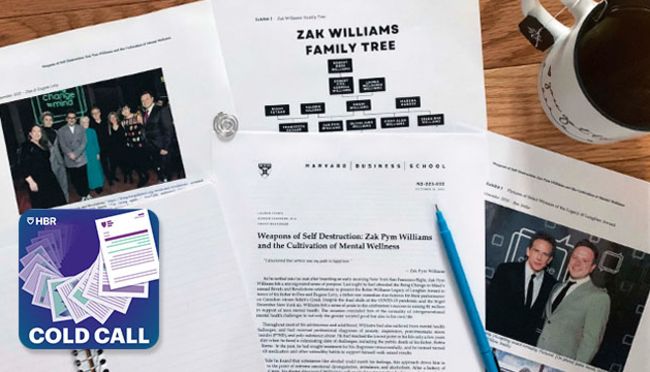
- 09 May 2023
- Cold Call Podcast
Can Robin Williams’ Son Help Other Families Heal Addiction and Depression?
Zak Pym Williams, son of comedian and actor Robin Williams, had seen how mental health challenges, such as addiction and depression, had affected past generations of his family. Williams was diagnosed with generalized anxiety disorder, depression, and post-traumatic stress disorder (PTSD) as a young adult and he wanted to break the cycle for his children. Although his children were still quite young, he began considering proactive strategies that could help his family’s mental health, and he wanted to share that knowledge with other families. But how can Williams help people actually take advantage of those mental health strategies and services? Professor Lauren Cohen discusses his case, “Weapons of Self Destruction: Zak Pym Williams and the Cultivation of Mental Wellness.”
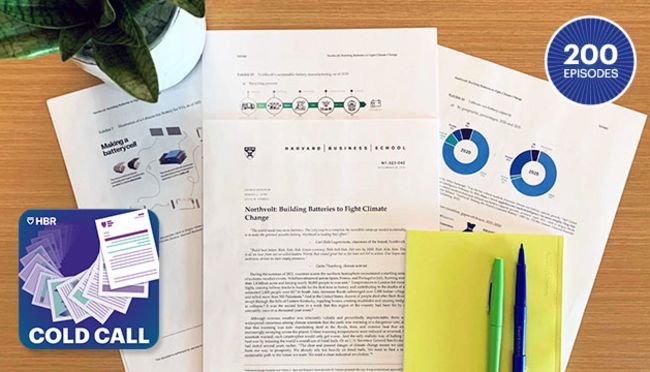
- 28 Apr 2023
- Cold Call Podcast
Sweden’s Northvolt Electric Battery Maker: A Startup with a Mission
In Stockholm, Sweden an upstart battery maker, Northvolt, is trying to recreate the value chain for European car manufacturers making the switch to EVs. With two founders from Tesla and two experienced financiers at the helm, the company seems bound for success. But can they partner with government, scale fast enough, and truly be part of the climate solution? Harvard Business School professor George Serafeim discusses what it takes to scale a business—the right people, in the right place, at the right time—with the aim of providing a climate solution in the case, “Northvolt, Building Batteries to Fight Climate Change.” As part of a new first-year MBA course at Harvard Business School, this case examines the central question: what is the social purpose of the firm?
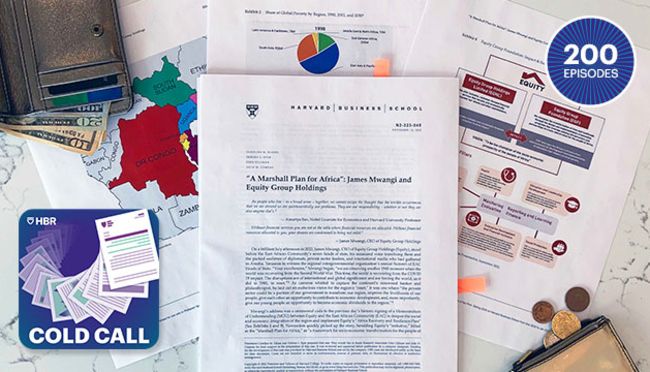
- 27 Apr 2023
- Cold Call Podcast
Equity Bank CEO James Mwangi: Transforming Lives with Access to Credit
James Mwangi, CEO of Equity Bank, has transformed lives and livelihoods throughout East and Central Africa by giving impoverished people access to banking accounts and micro loans. He’s been so successful that in 2020 Forbes coined the term “the Mwangi Model.” But can we really have both purpose and profit in a firm? Harvard Business School professor Caroline Elkins, who has spent decades studying Africa, explores how this model has become one that business leaders are seeking to replicate throughout the world in her case, “A Marshall Plan for Africa': James Mwangi and Equity Group Holdings.” As part of a new first-year MBA course at Harvard Business School, this case examines the central question: what is the social purpose of the firm?
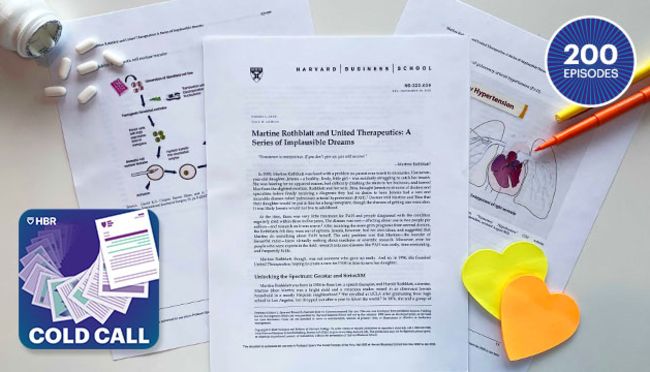
- 26 Apr 2023
- Cold Call Podcast
How Martine Rothblatt Started a Company to Save Her Daughter
When serial entrepreneur Martine Rothblatt (founder of Sirius XM) received her seven-year-old daughter’s diagnosis of Pulmonary Arterial Hypertension (PAH), she created United Therapeutics and developed a drug to save her life. When her daughter later needed a lung transplant, Rothblatt decided to take what she saw as the logical next step: manufacturing organs for transplantation. Rothblatt’s entrepreneurial career exemplifies a larger debate around the role of the firm in creating solutions for society’s problems. If companies are uniquely good at innovating, what voice should society have in governing the new technologies that firms create? Harvard Business School professor Debora Spar debates these questions in the case “Martine Rothblatt and United Therapeutics: A Series of Implausible Dreams.” As part of a new first-year MBA course at Harvard Business School, this case examines the central question: what is the social purpose of the firm?
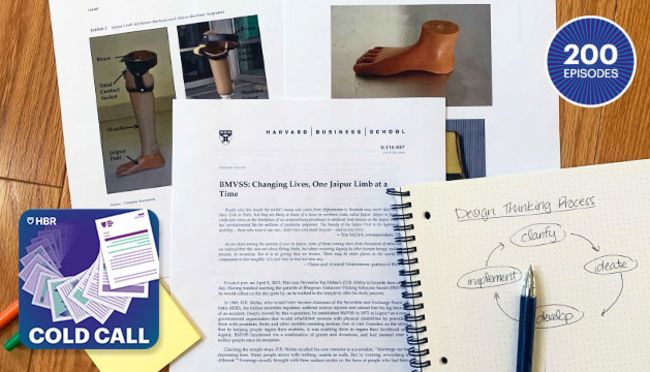
- 25 Apr 2023
- Cold Call Podcast
Using Design Thinking to Invent a Low-Cost Prosthesis for Land Mine Victims
Bhagwan Mahaveer Viklang Sahayata Samiti (BMVSS) is an Indian nonprofit famous for creating low-cost prosthetics, like the Jaipur Foot and the Stanford-Jaipur Knee. Known for its patient-centric culture and its focus on innovation, BMVSS has assisted more than one million people, including many land mine survivors. How can founder D.R. Mehta devise a strategy that will ensure the financial sustainability of BMVSS while sustaining its human impact well into the future? Harvard Business School Dean Srikant Datar discusses the importance of design thinking in ensuring a culture of innovation in his case, “BMVSS: Changing Lives, One Jaipur Limb at a Time.”
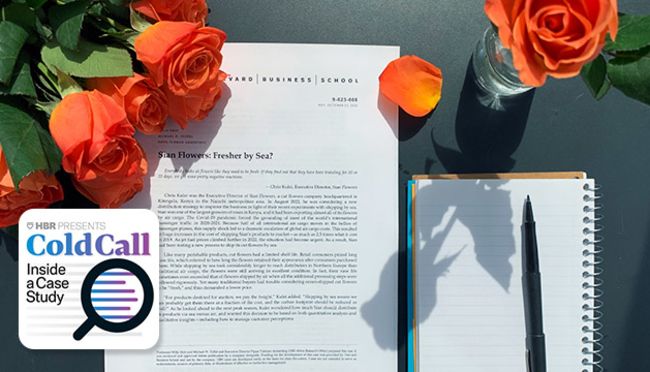
- 11 Apr 2023
- Cold Call Podcast
A Rose by Any Other Name: Supply Chains and Carbon Emissions in the Flower Industry
Headquartered in Kitengela, Kenya, Sian Flowers exports roses to Europe. Because cut flowers have a limited shelf life and consumers want them to retain their appearance for as long as possible, Sian and its distributors used international air cargo to transport them to Amsterdam, where they were sold at auction and trucked to markets across Europe. But when the Covid-19 pandemic caused huge increases in shipping costs, Sian launched experiments to ship roses by ocean using refrigerated containers. The company reduced its costs and cut its carbon emissions, but is a flower that travels halfway around the world truly a “low-carbon rose”? Harvard Business School professors Willy Shih and Mike Toffel debate these questions and more in their case, “Sian Flowers: Fresher by Sea?”
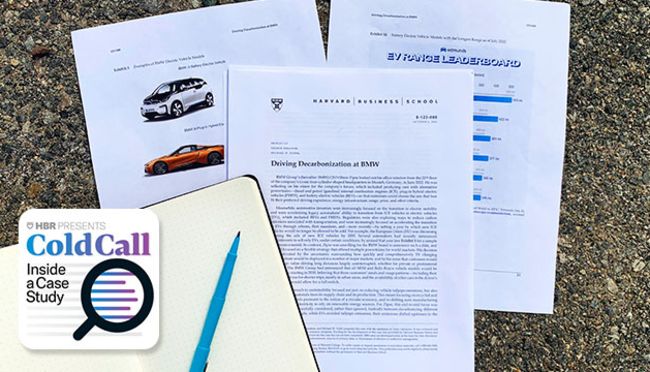
- 28 Mar 2023
- Cold Call Podcast
BMW’s Decarbonization Strategy: Sustainable for the Environment and the Bottom Line
In mid-2022, automakers, consumers, regulators, and investors were focusing on the transition from internal combustion engine (ICE) vehicles to electric vehicles (EV). While this would reduce tail-pipe emissions, it ignored the fact that the production of EVs—and especially their batteries—increases emissions in the supply chain. Many automakers were announcing deadlines by which they would stop selling ICE vehicles altogether, buoyed by investment analysts and favorable press. But BMW decided to focus on lifecycle emissions and pursued a flexible powertrain strategy by offering vehicles with several options: gasoline and diesel-fueled ICE, plug-in hybrid electric vehicles, and battery electric vehicles. That approach received a frostier reception in the stock market. Assistant Professor Shirley Lu discusses how BMW plans to convince stakeholders that its strategy is good for both the environment and the company’s financial performance in the case, “Driving Decarbonization at BMW.”
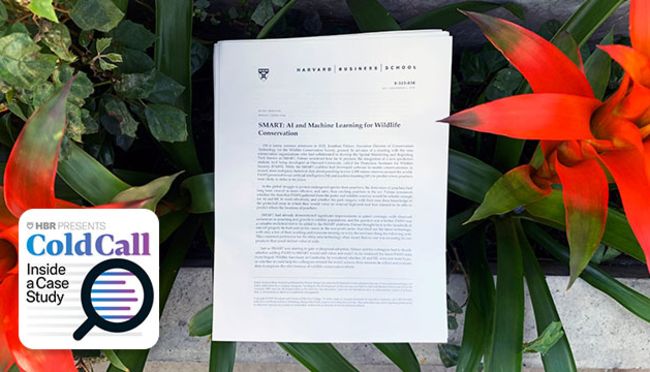
- 14 Mar 2023
- Cold Call Podcast
Can AI and Machine Learning Help Park Rangers Prevent Poaching?
Globally there are too few park rangers to prevent the illegal trade of wildlife across borders, or poaching. In response, Spatial Monitoring and Reporting Tool (SMART) was created by a coalition of conservation organizations to take historical data and create geospatial mapping tools that enable more efficient deployment of rangers. SMART had demonstrated significant improvements in patrol coverage, with some observed reductions in poaching. Then a new predictive analytic tool, the Protection Assistant for Wildlife Security (PAWS), was created to use artificial intelligence (AI) and machine learning (ML) to try to predict where poachers would be likely to strike. Jonathan Palmer, Executive Director of Conservation Technology for the Wildlife Conservation Society, already had a good data analytics tool to help park rangers manage their patrols. Would adding an AI- and ML-based tool improve outcomes or introduce new problems? Harvard Business School senior lecturer Brian Trelstad discusses the importance of focusing on the use case when determining the value of adding a complex technology solution in his case, “SMART: AI and Machine Learning for Wildlife Conservation.”
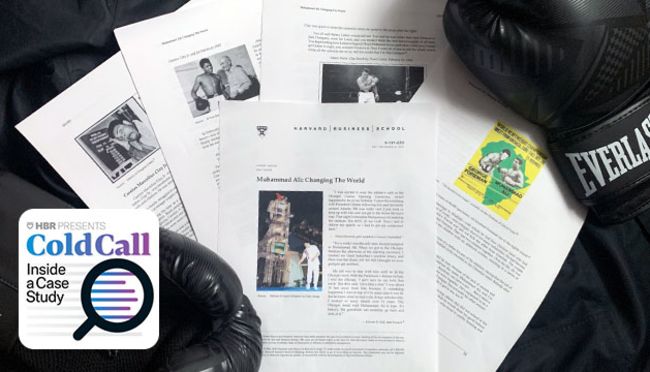
- 28 Feb 2023
- Cold Call Podcast
Muhammad Ali: A Case Study in Purpose-Driven Decision Making
Muhammad Ali, born Cassius Marcellus Clay Jr., rose from a poor family in segregated Louisville, Kentucky to international fame, winning three heavyweight boxing titles and becoming a civil rights leader and role model for millions of people around the world. How did he do it? Early in his career, Ali’s creativity and hard work helped him overcome significant obstacles. Rather than letting his fear of flying keep him from competing in the 1960 Olympics, he traveled to Italy wearing a parachute -- and easily won the gold medal in boxing. When he returned to the U.S. as a gold medalist, Ali used his growing fame to bring attention to racism and humanitarian causes he supported, including his then-controversial decision to refuse to fight in the Vietnam War. Professor Robert Simons discusses how Ali made decisions throughout his life and career to leave a lasting impact on the world in his case, “Muhammad Ali: Changing the World.”
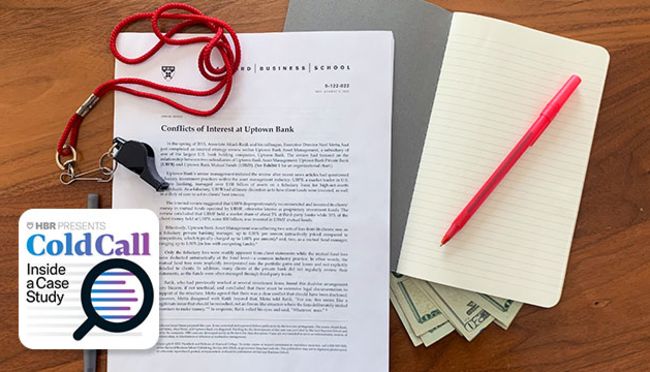
- 14 Feb 2023
- Cold Call Podcast
Does It Pay to Be a Whistleblower?
In 2013, soon after the US Securities and Exchange Commission (SEC) had started a massive whistleblowing program with the potential for large monetary rewards, two employees of a US bank’s asset management business debated whether to blow the whistle on their employer after completing an internal review that revealed undisclosed conflicts of interest. The bank’s asset management business disproportionately invested clients’ money in its own mutual funds over funds managed by other banks, letting it collect additional fees—and the bank had not disclosed this conflict of interest to clients. Both employees agreed that failing to disclose the conflict was a problem, but beyond that, they saw the situation very differently. One employee, Neel, perceived the internal review as a good-faith effort by senior management to identify and address the problem. The other, Akash, thought that the entire business model was problematic, even with a disclosure, and believed that the bank may have even broken the law. Should they escalate the issue internally or report their findings to the US Securities and Exchange Commission? Harvard Business School associate professor Jonas Heese discusses the potential risks and rewards of whistleblowing in his case, “Conflicts of Interest at Uptown Bank.”
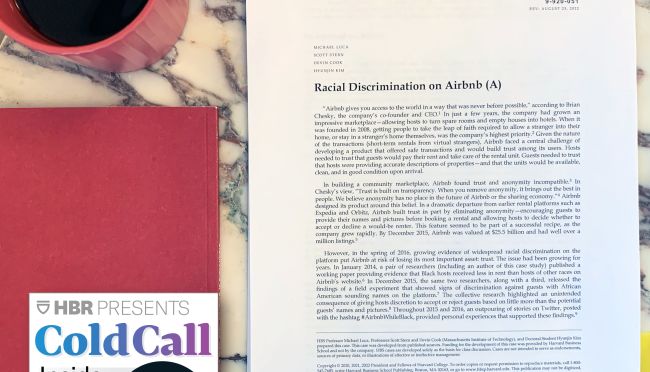
- 31 Jan 2023
- Cold Call Podcast
Addressing Racial Discrimination on Airbnb
For years, Airbnb gave hosts extensive discretion to accept or reject a guest after seeing little more than a name and a picture, believing that eliminating anonymity was the best way for the company to build trust. However, the apartment rental platform failed to track or account for the possibility that this could facilitate discrimination. After research published by Professor Michael Luca and others provided evidence that Black hosts received less in rent than hosts of other races and showed signs of discrimination against guests with African American sounding names, the company had to decide what to do. In the case, “Racial Discrimination on Airbnb,” Luca discusses his research and explores the implication for Airbnb and other platform companies. Should they change the design of the platform to reduce discrimination? And what’s the best way to measure the success of any changes?
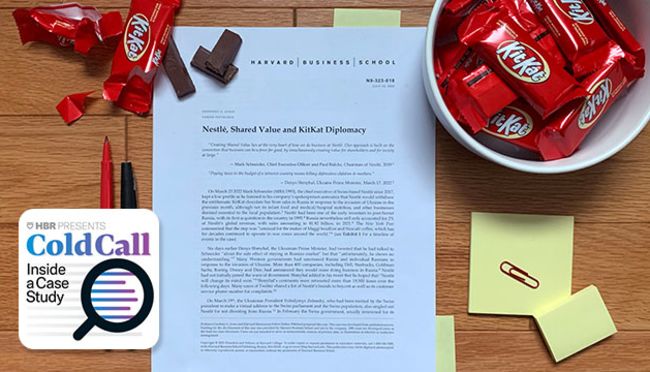
- 17 Jan 2023
- Cold Call Podcast
Nestlé’s KitKat Diplomacy: Neutrality vs. Shared Value
In February 2022, Russia invaded Ukraine, and multinational companies began pulling out of Russia, in response. At Switzerland-based Nestlé, chief executive Mark Schneider had a difficult decision to make. Nestlé had a long tradition of neutrality that enabled it to operate in countries regardless of their political systems and human rights policies. But more recently the company had embraced Michael Porter’s “shared value” paradigm, which argues that companies have a responsibility to improve the business community and the health of their communities. What should Schneider do? Professor Geoffrey Jones discusses the viability of the shared value concept and the social responsibility of transnational corporations today in the case, “Nestlé, Shared Value and Kit Kat Diplomacy.”

- 03 Jan 2023
- Cold Call Podcast
Wordle: Can a Pandemic Phenomenon Sustain in the Long Term?
Wordle went from a personal game, created by a developer for his girlfriend, to a global phenomenon with two million users in just a few months. Then The New York Times made an unexpected bid to acquire it. But will Wordle outlast other pandemic pastimes? Harvard Business School senior lecturer Christina Wallace discusses the journey of software engineer and accidental entrepreneur Josh Wardle in the case, “Wordle.”
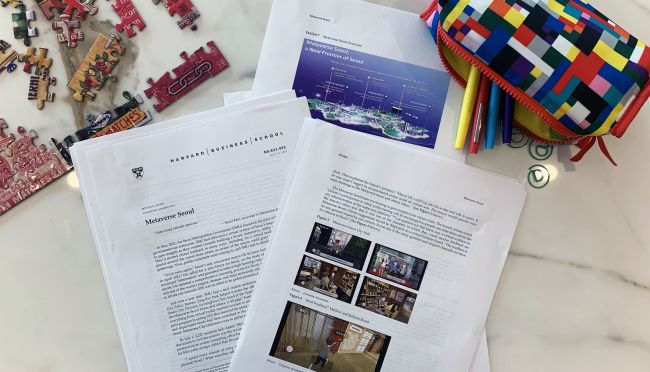
- 13 Dec 2022
- Cold Call Podcast
Metaverse Seoul: How One City Used Citizen Input to Pilot a Government-Run Metaverse
In May 2022, the Seoul Metropolitan Government in Seoul, Korea launched the pilot of Metaverse Seoul, a virtual version of Seoul’s mayor’s office. As they worked towards building a broad, immersive, online government platform, they hoped to gain insights from citizens about everything from popular local tourist sites that could be experienced virtually to government services that could be delivered in the metaverse. But to do that, the team had to figure out how to solicit ideas from citizens and then determine which ideas to put to use. Professor Mitchell Weiss discusses their approach, as well as questions relating to his research on public entrepreneurship and what he calls “possibility government,” in his case, “Metaverse Seoul.”

- 29 Nov 2022
- Cold Call Podcast
How Will Gamers and Investors Respond to Microsoft’s Acquisition of Activision Blizzard?
In January 2022, Microsoft announced its acquisition of the video game company Activision Blizzard for $68.7 billion. The deal would make Microsoft the world’s third largest video game company, but it also exposes the company to several risks. First, the all-cash deal would require Microsoft to use a large portion of its cash reserves. Second, the acquisition was announced as Activision Blizzard faced gender pay disparity and sexual harassment allegations. That opened Microsoft up to potential reputational damage, employee turnover, and lost sales. Do the potential benefits of the acquisition outweigh the risks for Microsoft and its shareholders? Harvard Business School associate professor Joseph Pacelli discusses the ongoing controversies around the merger and how gamers and investors have responded in the case, “Call of Fiduciary Duty: Microsoft Acquires Activision Blizzard.”

Diversity and Inclusion at Mars Petcare: Translating Awareness into Action
In 2020, the Mars Petcare leadership team found themselves facing critically important inclusion and diversity issues. Unprecedented protests for racial justice in the U.S. and across the globe generated demand for substantive change, and Mars Petcare's 100,000 employees across six continents were ready for visible signs of progress. How should Mars’ leadership build on their existing diversity, equity, and inclusion efforts and effectively capitalize on the new energy for change? Harvard Business School associate professor Katherine Coffman is joined by Erica Coletta, Mars Petcare’s chief people officer, and Ibtehal Fathy, global inclusion and diversity officer at Mars Inc., to discuss the case, “Inclusion and Diversity at Mars Petcare.”